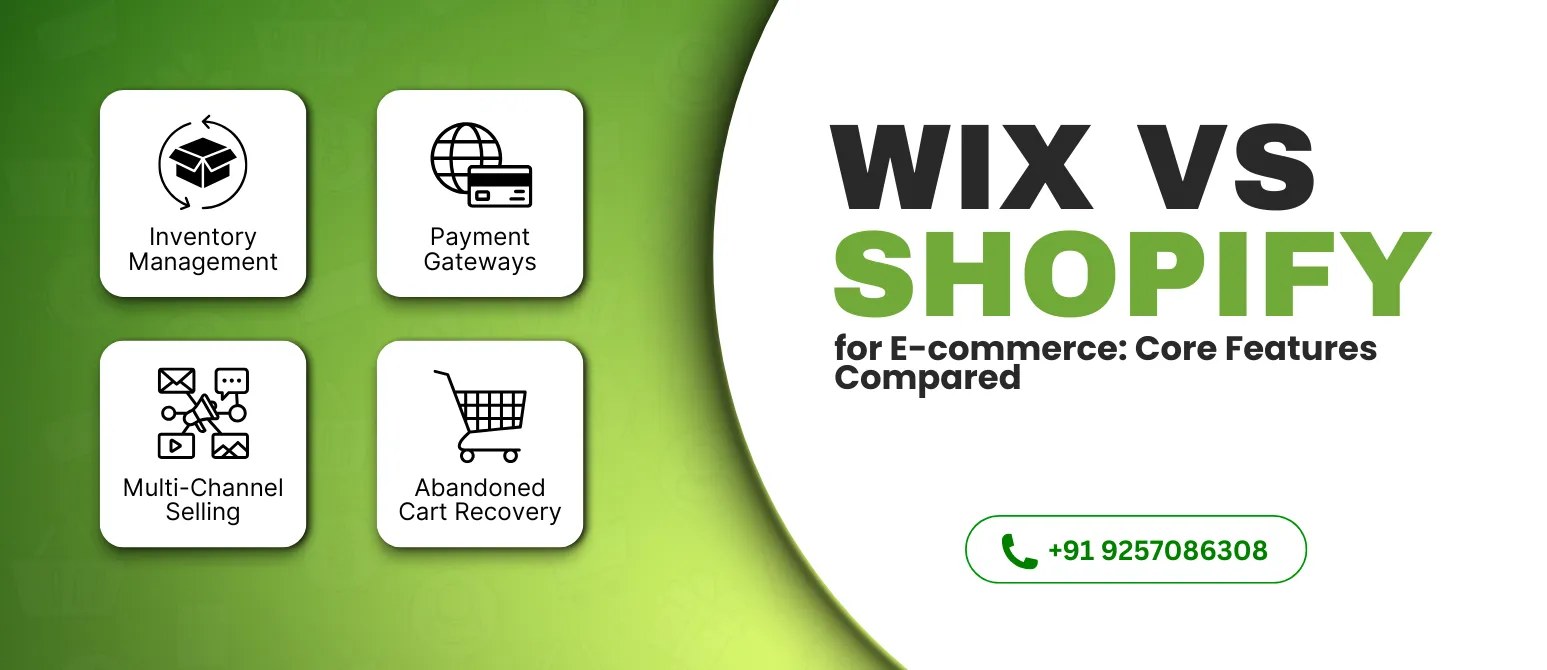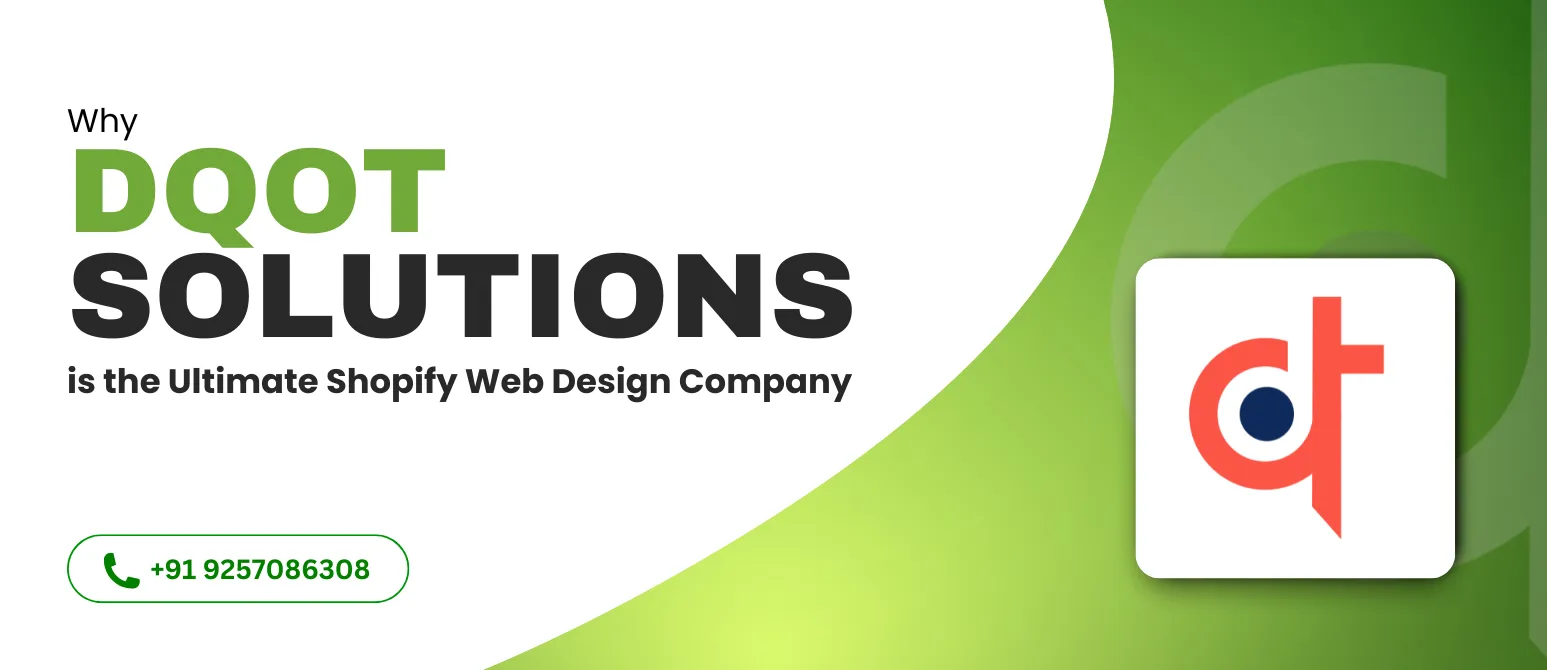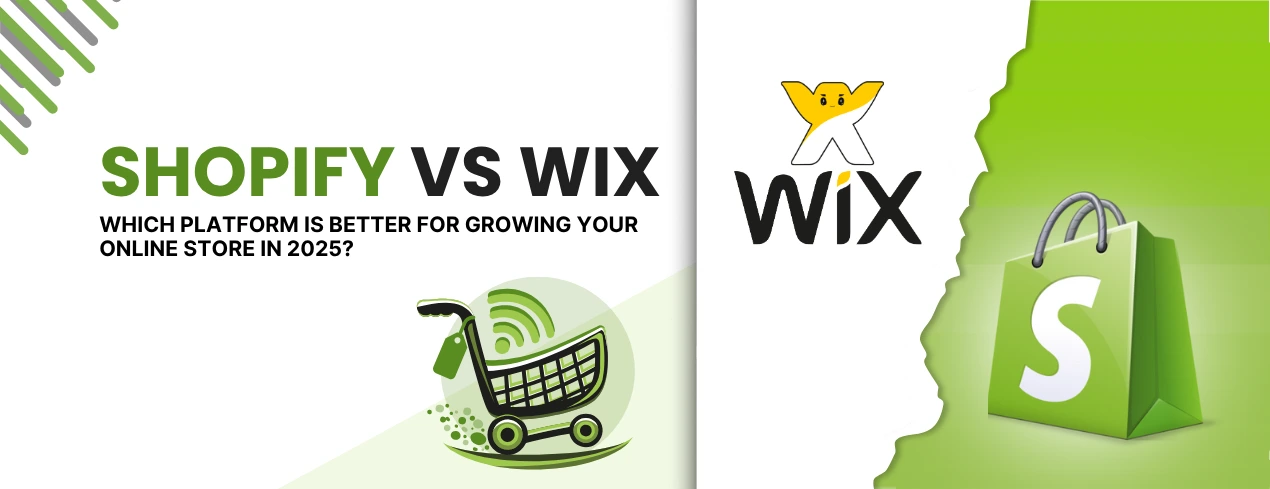Selecting an appropriate platform to build your online shop is one of the decisions that can greatly determine the success of your enterprise. In 2025, among entrepreneurs and business owners, the controversial issue of Shopify vs Wix remains hot, particularly in light of such aspects as convenience, cost-efficiency, online shop functionalities, and scalability. These two platforms have their strengths, but how do you choose which would be better to grow your online store and especially in the Indian markets?
In this detailed comparison guide, we are going to get into the nitty-gritty of comparing Shopify with Wix, including user interface and UI/ UX design, and some of the essential factors like their price, design flexibility, and e-commerce features. We will also point out the wisdom of involving a Shopify web design company, such as Dqot Solutions, to take your online store to its new levels in order to achieve an effortless e-commerce platform that is scalable.
Table of Contents
Understanding Shopify and Wix: A Brief Overview

Before plunging into the comparison of Shopify vs Wix as e-commerce solutions, it is imperative to understand what they are. Wix and Shopify are among the most common e-commerce platforms, and they serve unique business requirements.
Shopify is a dedicated e-commerce platform designed to sell online. It was launched in 2006 and supports over 1.7 million businesses with solid, committed tools in payment processing, multi-channel selling, and inventory management. Shopify is known to be scalable and thereby suitable for businesses that want to grow fast, such as startups and international brands.
Wix started off, however, as a general website building system in 2006 and has included e-commerce functionalities since. Having acquired over 200 million users, Wix is also well-known as a result of its easy drag-and-drop functionality that commercial small businesses, bloggers, and creative entrepreneurs are interesting and prefer to employ to have a decent-looking site with the real ability to place orders online.
In this Shopify vs Wix comparison, we are going to discover which platform is more aligned with what you want to achieve, whether you are a small business owner in India or a growing business that is seeking sophisticated e-commerce capabilities.
Shopify vs Wix Pricing: Which Platform Offers Better Value?
In this Shopify vs Wix comparison, we are going to discover which platform is more aligned with what you want to achieve, whether you are a small business owner in India or a growing business that is seeking sophisticated e-commerce capabilities.
Shopify Pricing Plans
The pricing of Shopify is e-commerce-oriented, based on your business’s scaling. As of 2025, Shopify plans (paid on an annual basis) are as follows:
- Basic Plan ($29/month): It is perfect when you want to start an enterprise, and its provisions include unlimited products, 10 inventory locations, and basic analytics. It is an excellent beginning with small/medium-sized stores.
- Grow Plan ($79/month): This one is a more serious plan to support growing businesses and includes more staff accounts, processing fees that are reduced when using Shopify Payments, and some more advanced reporting.
- Advanced Plan ($299/month): The advanced plan suits big companies because it has excellent analytics, custom reports, and lower transaction fees.
- Shopify Plus: This is a special merchants’ enterprise solution that is designed to accommodate high-volume merchants, with advanced features such as selling wholesale and expansion tools across countries.
Shopify also has a free trial offer of 3 days as well as a special offer of paying only $1 per month for the first 3 months, hence making it affordable for the business to try the platform. However, when you secure third-party payment gateways rather than Shopify Payments, preset transaction fees are between 0.5 and 2%, depending on your plan specification.
Wix Pricing Plans
Wix allows a cheaper entry, with a free plan, but the e-commerce functionalities are feature-locked to paid plans. The e-commerce plans of Wix are:
- Core Plan ($29/month): Includes basic e-commerce features, unlimited bandwidth, and a free domain for a year. It is applicable in smaller shops with a smaller number of products.
- Business Plan ($36/month): Offers more robust e-commerce tools, such as tax calculators, dropshipping, and multi-currency support.
- Business Elite Plan ($159/month): The top-tier plan includes priority support and advanced features for larger stores.
- Wix Enterprise: A custom-priced solution for businesses needing tailored features.
Wix does not impose any commission on the transactions besides the normal charges on payment processing, which depend on the region. With a 14-day free trial, it gives users enough time to see the platform, and the free plan is just a bonus to users who are not yet ready to spend money on it.
Pricing Comparison for Indian Businesses
As Indian merchants are concerned, Shopify vs Wix prices in India are of high significance. The plans of Shopify begin at ₹1,499/month in its Basic package, and stretch up to ₹5,599/month in high-end plans. Wix is cheaper and, therefore, most preferred by the small-scale Indian businesses that want to reduce the initial investment cost. Nonetheless, most of the functions offered by Shopify and its scalability property make it a superior investment option in the long run for business enterprises that intend on the future grow.
Which Offers Better Value?
Comparing Shopify and Wix prices, the latter seems to be less expensive with the free plan and a lower tariff, which makes it more accessible to small companies or a newly launched business. Yet, more features of the e-commerce offered by Shopify, including live shipping rates and substantial support of apps, are more valuable to developing businesses. Indian e-commerce stores that seek scalability have a reason to invest in Shopify, its scalable features, and global reach.
Wix vs Shopify for E-commerce: Core Features Compared

When evaluating Wix vs Shopify for e-commerce, the platforms’ core features determine their suitability for your online store. Let’s break down the key e-commerce functionalities.
Inventory Management
Shopify is exceptional in inventory management, and it has tools to easily track Inventory, set low-inventory alerts, and even automate purchase orders. Its system applies to businesses with huge stocks that can have variants of more than one product. Another feature of Shopify is to connect third-party inventory applications to have more functionality.
Although Wix is better, it will be more appropriate for small shops. It offers inventory management tools that enable automatic stock updates and manual change of status, but do not provide the in-depth functionality of native Shopify. Businesses with complicated inventory requirements will definitely want to go with Shopify.
Payment Gateways
There are more than 100 payment gateways already integrated with Shopify, including PayPal, Stripe, Razorpay, and Paytm, which makes it perfect to suit the needs of Indian merchants working with a vast audience. Shopify Payments does not require a transaction fee to be paid, whereas third-party gateways have a fee ranging between 0.5 and 2%.
Wix works with approximately 50 payment gateways, such as PayU Biz India, Cashfree Payments, and Razorpay. Although the range of options provided by Wix is enough when dealing with a small business, it reduces its capacity to scale with Shopify.
Multi-Channel Selling
What makes Shopify such a strong tool is its multi-channel possibilities, enabling you to sell on marketplaces such as Amazon, eBay, and social media, on platforms like Instagram and Facebook. This is of great value to businesses trying to increase their reach.
Wix also allows selling across multiple channels with 3rd party apps, such as Ecwid, that integrate with both, but do not have the same functionality as that offered by Shopify. Shopify is the better choice when it comes to businesses that prioritize world or cross-platform sales.
Abandoned Cart Recovery
Both platforms provide the option of abandoned cart recovery, but Shopify has a slight advantage with the ability to utilize what they refer to as “browse abandonment”, which targets those who viewed products without adding them to their cart. Wix has a solid abandoned cart system, although it is underdeveloped in that it uses programmable set triggers to dispatch emails automatically.
Design Flexibility: Shopify vs Wix Web Design
Design plays a very big role in any online store since it influences user experience (UX) and conversions. So, how do Shopify and Wix stack up against each other in terms of web design and UI/UX functionality?
Shopify Web Design and UI/UX
Shopify has more than 70 no-code themes available on its platform, some of which are free and some paid. These are made to be e-commerce friendly, mobile-responsive, and consistent. The content of the templates in Shopify is functionality-oriented, and the layout is pure and clean to achieve greater conversions. But, when it comes to customizations, Shopify has a less flexible drag-and-drop editor that needs basic coding skills to implement more sophisticated changes.
The entry of a Shopify web design services provider like Dqot Solutions can go a long way in closing this gap. Dqot Solutions has expertise in the development of Shopify websites with custom themes and is skilled in maximizing the UI/UX design so that the customer is engaged by the web design. Their experience guarantees the visual appearance of your Shopify store to be fantastic, easy to use, and fit your brand in every possible way.
Wix Web Design and UI/UX
Wix is also known to have a drag-and-drop editor that allows maximum design flexibility. Wix has more than 800 templates (100+ of them are specifically designed to be used in e-commerce websites), and all of them can be altered by the user in their own way without coding skills required. This is why Wix best suits innovative business owners who value their visual appeal.
Nevertheless, Wix templates are not customizable after making a choice, so flexibility is restricted over time. Wix lacks the professional, structured design that businesses with the need for a scalable design might require, compared to Shopify, which can be enhanced by experts in Shopify UI/UX design like Dqot Solutions.
Why Choose DQOT Solutions for Shopify Web Design?
DQOT Solutions is one of the most popular Shopify web design companies, which has an individual solution for both small and large businesses. They have a team of professionals motivated to develop outstanding visual quality Shopify stores with flawless UI/UX design. Through the power of the Shopify firm platform, DQOT Solutions guarantees your outlet optimization in terms of conversion rates and mobile-friendly as well as scaling. Be it a custom theme or edge e-commerce, DQOT Solutions provides solutions that grow.
Shopify vs Wix for SEO and Marketing
Marketing and search engine optimization (SEO) tools are critical in ensuring that traffic and sales are driven towards your web store. Now, let us see how Shopify and Wix fare as regards this aspect.
SEO Capabilities
Shopify includes powerful search engine optimization elements, such as meta tags that can be customized, alt text, sitemaps, and the speed of the site, which are important in ranking higher on the search engines. It is combined with tools such as Google Shopping and Meta Ads, which help to be more visible in the sphere of e-commerce business.
Wix also offers sufficient SEO features such as tailorable URLs, meta tags, and the now-defunct Ascend suite of tools, which assist with comprehensive optimization. Nonetheless, the URL structure and the technical SEO capacities of Wix remain a bit lower than those of Shopify, especially for stores intending to expand widely.
Marketing Tools
Extensive marketing integrations are available in Shopify, which has more than 8,000 apps available in the app store, with the integration of email marketing (e.g., Klaviyo), social media advertising, and analytics solutions. The AI tool, Shopify Magic, will auto-create the product description, frequently asked questions, and even email copy, and make the marketing process simpler.
Wix also offers built-in tools in marketing like email campaigns and social media integration, and they are awesome for small businesses. It has a smaller app marketplace, though (approximately 1,000 apps), with fewer options to engage in advanced marketing.
Scalability: Which Platform Supports Long-Term Growth?
Another major consideration when a business intends to expand is scalability. Shopify vs Wix: Which one is the better choice in terms of supporting growth?
Shopify’s Scalability
The Shopify platform is designed to be scalable, to support any size of business, including start-ups and large global brands. Its business model, Shopify Plus, is capable of wholesale selling, international business, and custom integration. The app store and APIs available on Shopify are very strong and give businesses the opportunity to bring functionality on board as they scale, making it a good choice in medium and large-sized e-commerce shops.
Wix’s Scalability
Wix is more affordable for small to medium-sized enterprises. Although its Enterprise plan provides custom-tailored solutions, Wix cannot compete with the level of advanced features that Shopify has, like the ability to manage in real-time shipping or to provide sophisticated inventory management. Businesses with vast stock or the vision of going global will not be satisfied with the growth potential of Wix.
Shopify vs Wix in India: Which is Better for Indian Merchants?
Shopify vs Wix in India can be summarized as both platforms are suitable options, but each business will need to select the platform based on their business needs. Incorporating a wide range of payment gateways, such as Razorpay and Paytm, makes Shopify useful for diverse Indian customers. It is highly scalable and allows multi-channel selling, which makes it suitable for companies that want to internationalize.
Wix- as it is inexpensive and simple to use, one could closely utilize it in a small-scale Indian business or a startup having a lower budget. Its drag-and-drop builder makes setting up a shop very fast, but its few payment gateways and inventory management features may still not be ideal for growing a large business.
Why DQOT Solutions is the Ultimate Shopify Web Design Company

Investing in a Shopify web design firm like DQOT Solutions will play an essential role in businesses that opt to use Shopify.
These are the reasons why DQOT Solutions is the best:
- Custom Shopify Website Development: DQOT Solutions develops unique Shopify websites that fit perfectly into your brand to give you a distinct and professional online presence.
- Expert UI/UX Design: They will also improve your conversion and user satisfaction levels by working on the user interface/experience of your store.
- Scalable Solutions: DQOT Solutions designs stores to expand with your business, and incorporates complex features, such as multi-channel retailing and stock keeping.
- SEO and Marketing Expertise: They help increase the exposure of your store through SEO-based designs and marketing integrations, thus generating traffic and sales.
- Dedicated Support: DQOT Solutions offers dedicated support and maintenance of the store, such that it is always updated and competitive.
By partnering with DQOT Solutions, you will be able to take advantage of the capabilities that Shopify has to offer, coupled with a commitment towards design and development, and your Shopify online store will be ready to thrive in 2025 and beyond.
Shopify Competitors: How Does Shopify Stack Up?
Although Shopify is one of the most popular e-commerce platforms, it is good to look at other alternatives to Shopify to make the right decision. Alternative solutions exist in the form of platforms such as WooCommerce, BigCommerce, and Squarespace:
- WooCommerce: This is a WordPress plug-in that grants users a large amount of customization, but they also need to be technically savvy and have hosting facilities separate from Shopify, where everything is covered.
- BigCommerce: BigCommerce is comparable to Shopify but more complex and lacks in the number of app integrations.
- Squarespace: Known for its design-oriented templates, Squarespace is not as expansive as Shopify when it comes to large online shops.
Shopify is simple to use and can be scaled up easily, which, combined with a Shopify web design company like DQOT Solutions, makes it one of the best e-commerce platforms.
Future Growth and Investment Potential
Where to invest is important when it comes to achieving success in the long run. The emphasis that Shopify places on scalability, selling internationally, and sophisticated analytics makes the site a future-proof business. Its Shopify Plus package and a vast app store enable companies to respond to the new trends, including AI-powered personalization and omnichannel retailing.
Although Wix is user-friendly, it is more appropriate for businesses that have less complex needs. It is not scalable and does not offer advanced capabilities as easily as Shopify since it uses third-party apps.
To investors, the reputation of Shopify, used by millions of customers and sustainable innovation ( e.g, Shopify Magic and Sidekick AI) is an attractive option. Working with a Shopify web-designing company such as DQOT Solutions will help you maximize your store even more, as you will gain a significant payoff in terms of professional design and tactical execution.
Final Words
When comparing Shopify with Wix, the most appropriate platform depends on what your business aims to achieve. Wix provides a decent solution and fits well with small businesses or creative entrepreneurs who want to focus more on functionalities because of affordability and the drag-and-drop editor. But in the case of a growing business, particularly in such a market as India, Shopify, with its robust e-commerce capabilities, growth, and versatile app marketplace, is the better choice.
When you collaborate with a Shopify web design firm such as DQOT Solutions, you can take your online store to the next level. They have the knowledge of how to develop Shopify websites and make them user-friendly and performant with the help of UI/UX design, guaranteeing the development of a store that promotes growth. Starting a new store or expanding an existing one in 2025, Shopify, with the custom solutions offered by Dqot Solutions, is the ultimate solution for having a successful online store.
FAQs About Shopify vs Wix for E-commerce
The decision between Shopify and Wix may bring a lot of questions. Common questions are addressed below as a way of assisting in making an informed decision.
Shopify is an online selling platform that is purpose-designed and provides sophisticated capabilities in multi-channel sales, inventory, and payment processing. Wix is a broad, hands-off web editor that includes e-commerce functionality, which suits either a small company or someone who requires a content-driven site that sells online in a simple way.
Overall, Wix is quite cheap with a free plan and the basic paid plans being charged at a rate of $29/month. Shopify costs $29/month but provides a greater variety of more e-commerce-specific features and is therefore a more appropriate long-term investment in a startup that aims to grow.
It is possible to switch to Shopify from Wix, but you have to know how to move products, content, and SEO settings. Shopify has migration tools and APIs, and the process can be simplified and smoothly transitioned with the help of a Shopify web design company like DQOT Solutions.
The wide choice of payment gateways and scalability offered by Shopify means that it will suit Indian merchants with growing businesses. Wix works well with small stores or start-ups with smaller budgets, but the feature set might not be more useful in the long-term expansion.
DQOT Solutions provides Shopify website development, custom UI/UX design, and SEO marketing, crafting high-performance stores that meet your brand. Their scalable solutions and round-the-clock support guarantee your store will succeed in a competitive marketplace.






